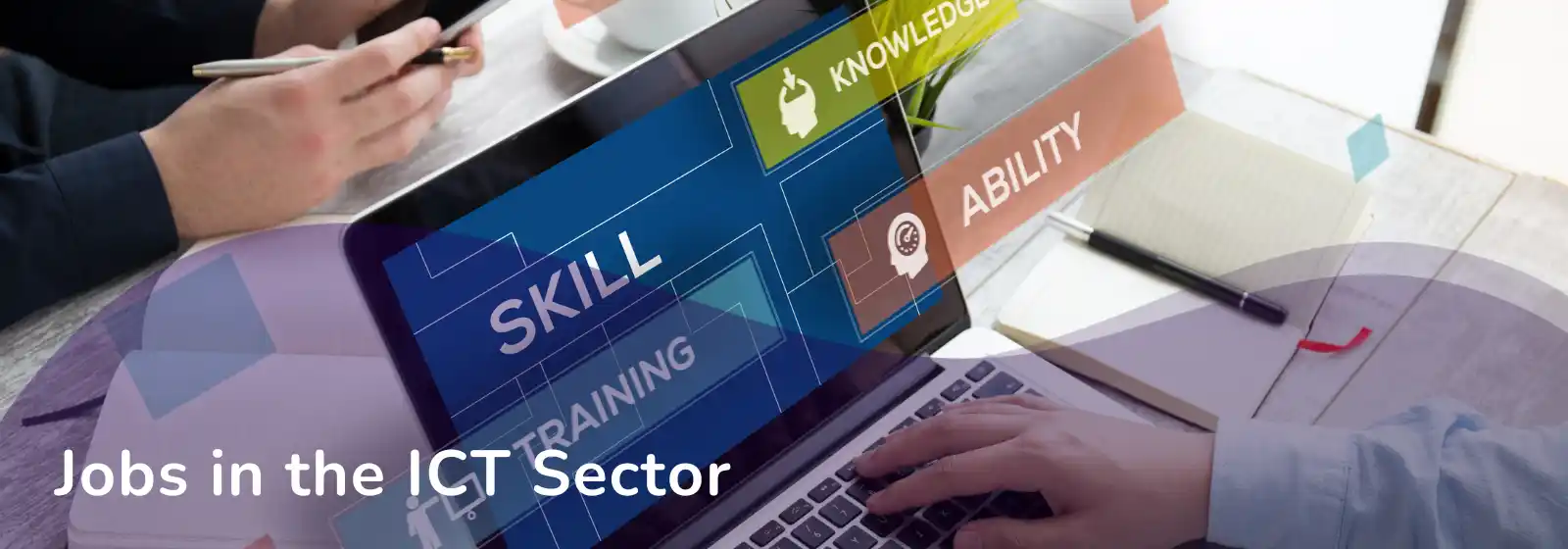Questions about the ICT sector answered
- What is Singapore’s ICT sector?
- Is the ICT sector stable if you’re considering a mid-career switch?
- What kind of jobs are there in the ICT sector?
- What’s the salary like?
- What are the growth areas in the ICT sector?
- What courses or skills are needed to join the ICT sector?
About Singapore’s Infocomm Technology (ICT) sector
Singapore is one of the world’s most wired countries and has one of the most technologically advanced Information and Communications Technology (ICT) markets. Ranked fifth in the world as a country with the highest digital quality of life, we offer world-class infrastructure, talent, and a vibrant ecosystem of partners.
As it stands, the ICT sector consists of many sub-sectors, such as fintech (financial technology), edtech (education technology), proptech (property technology) and legaltech (legal technology), to list a few. In addition, emerging technologies like blockchain, artificial intelligence and augmented reality also contribute to the continual expansion of the sector.
Size of the market
In addition to serving as the region’s trading centre, Singapore is universally regarded as the top leading tech hub in the Indo-Pacific, a key reason why 5,400 US entities are registered in Singapore. Singapore is home to more than 80 of the top 100 software and services companies, including Facebook, Google, and Microsoft, offering digital platforms and services that are key to the digital transformation of companies locally.
It also serves as a base for well-known media companies such as Lucasfilm, Walt Disney Company and Ubisoft, which complement local players and talents for a growing and vibrant technology and media industry.
Why is this sector important to Singapore’s economy?
As Singapore continues to build its digital economy, technology and media will be key drivers in transforming the way we live, work, play and learn in Singapore. A key enabler for all industries, technology and media will enhance Singapore’s competitiveness by raising productivity and transforming work processes through a highly skilled and specialised workforce.
Singapore’s Smart Nation journey began in 2014, with the vision to create new opportunities and to better the lives of people. The smart nation drive is an effort by the government to harness innovative technologies and solutions to transform the city-state in ICT, transportation, urban living, government services and businesses.
Since then, Singapore has embarked on various digital policies and implemented strategic national projects and initiatives. These efforts reduce friction between the government, businesses and citizens, improving productivity while paying attention to sustainability.
Singapore is also a key player in the 5G market. The government has invested heavily in rolling out 5G infrastructure and the city-state’s three major telco providers launched 5G services for consumers and businesses in 2020.
Growth areas and outlook of the ICT sector
In 2020, despite the challenges posed by the COVID-19 pandemic, the ICT sector in Singapore saw record growth. The sector’s output increased by 3.4% during the year, with the IT services and digital media sub-sectors seeing the strongest growth. This growth is expected to persist in the coming years, as more and more organisations look to digitalise their operations.
Another key factor driving the growth of Singapore’s ICT sector is the country’s focus on innovation. Singapore has a vibrant startup ecosystem, with a large number of incubators and accelerators providing support and resources to entrepreneurs.
To encourage innovation, the Government also introduced the Startup SG Founder scheme, which provides funding and mentorship to early-stage startups. This focus on innovation has led to the development of cutting-edge technologies and solutions in areas such as fintech, healthtech, and edtech.
Mid-career switch: Why is the ICT sector a good choice?
The ICT sector in Singapore is still actively hiring, with a strong demand for skilled professionals in areas such as software development, data analytics, and cybersecurity.
One of the main drivers of this demand is the ongoing digitalisation of businesses and organisations in Singapore. As more companies move their operations online and adopt digital technologies, they require professionals who can help them navigate the rapidly changing digital landscape.
5G technology is expected to provide a major boost to the ICT sector, with new opportunities arising in areas such as Industry 4.0, self-driving cars, and smart cities. As a result, companies in the sector are looking for professionals who have the skills and experience to take advantage of these opportunities.
What are the types of jobs, and what is the salary like in the ICT sector?
Jobs in tech can be found outside of tech companies. With digitalisation, many non-tech companies seek to widen and deepen their digital capabilities. The public service sector is also looking to bring more tech talent on board. The tech vacancies come under Tech for Public Good, a new government initiative to fill roles in the public sector.
Even in other businesses, such as banking and financial services, tech talent in areas such as cybersecurity and data analytics will be in high demand. Besides that, banks are searching for experience in environmental, social, and governance (ESG) efforts.
Here are some examples listed on the MyCareersFuture portal:
| Role | Salary Range |
| Full Stack Developer | $3,000 to $4,500 |
| Senior Data Engineer | $5,000 to $10,000 |
| Application Support Specialist | $4,500 to $6,000 |
| Frontend Engineer | $1,800 to $2,300 |
| Security Engineer | $1,500 to $2,100 |
| Business System Analyst | $3,800 to $4,800 |
| Automation Test Engineer | $3,500 to $5,000 |
| Software Consultant | $1,700 to $3,000 |
| Desktop Support Executive | $1,800 to $2,200 |
| Java Programmer | $1,800 to $2,400 |
What courses or skills are needed to join the ICT sector?
Initiatives such as the Infocomm Media Development Authority’s (IMDA) National Talent Development Initiatives and the SkillsFuture initiative provide funding and resources to help individuals develop the skills they need to succeed in the ICT sector.
Jobseekers or mid-career switchers keen on joining the ICT sector can up their chances of landing a job by upskilling themselves with WSG as Career Conversion Programmes (CCPs) with On-the-Job Training.
Some CCPs offered for roles in Infocomm technology are as below:
- CCP for Cloud Professionals – AWS Cloud Specialist
- CCP for Cloud Professionals – Oracle NetSuite Professionals
- CCP for Infocomm Sales and Marketing Professionals – Digital Marketing Specialist
- CCP for Platform and System Professionals – RedHat Professionals
- CCP for Tech Professionals – AI Engineer
So, if you’re keen on joining the ICT sector, there’s no better time than now to come on board or make the career switch! Here is some useful reading to help you learn more about the sector.

Tech Sector Hiring & Salary Outlook 2023: Sustained Demand for Tech Talents
Upskilling Digitally: What Certifications and Courses Matter in Singapore
Here Are the Top Tech Skills You Need for Your Resume
Job Search Tips: Top 5 Keywords to Include in Your IT Resume
Thinking of a Mid-Career Switch to ICT? Hear from Industry Veterans
Need to Prove Your Digital Skills for an Interview? Here’s How
What it Takes to Join the Fintech Industry in Singapore
Why Take Up a Programming Course in Singapore?
Top 5 Digital Skills You’ll Need in 2021 (and Possibly in 2022 Too)
Why You Should Jumpstart Your Career in IT With an SME
Working in Tech and Got Retrenched? Here’s a Guide to Looking Ahead for Singaporean Workers

How Employers Can Hire Digital Talent in a Disruptive Age
How Local Companies Are Shaking Up Traditional Industries With Artificial Intelligence
How to Get the Right Talent to Fill an Entry-Level Cyber Security Role

Pursuing a Career in FinTech? Consider These 5 Roles
Want to Thrive in Digital Marketing? Here Are the 5 Technical Skills You’ll Need
3 Skills You Need to Become a Successful UI Designer
4 Things You Must Learn as a UX Designer
What Can You Do With a Digital Marketing Certificate?
What Does a Data Analyst Do and the Skills Required
What Makes a Great Computer Engineer?
Want to Be a Software Engineer? Wow Your Interviewers With These Skillsets
IT Skills That Will Help Your E-commerce Career Soar
3 Must-Learn Skills for Successful SME E-Commerce Employment
Explore Singapore’s e-Commerce Industry: Entry-Level Jobs to Apply for
Is Cyber Security a Good Career Fit for You?
Why These Cyber Security Certifications Can Land You Your Dream Role
Data Analytics: What’s the Job Market Now, Who’s Hiring, and is it the Career for You















